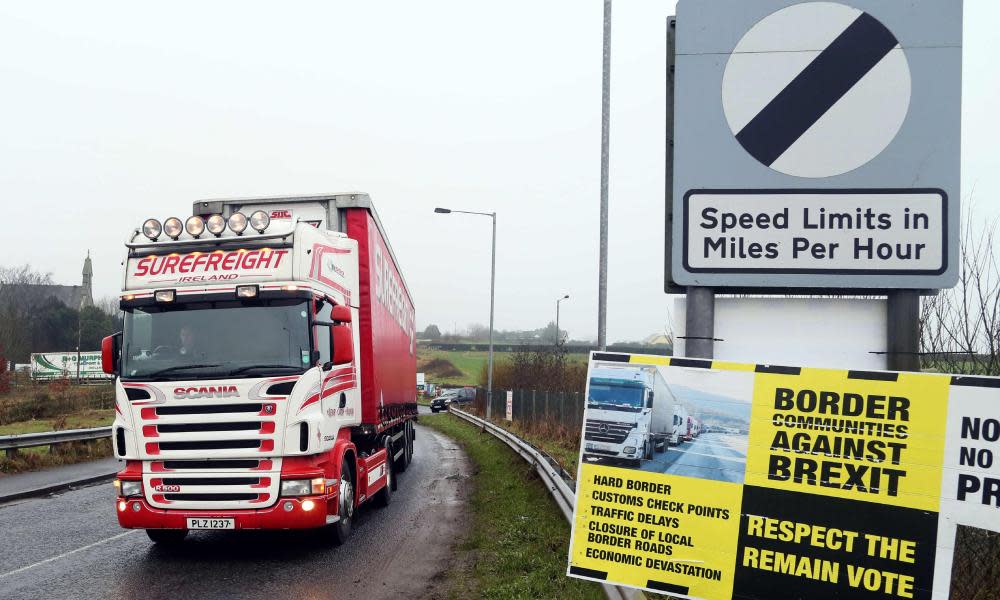UK accused of 'magical thinking' over Brexit plan for Irish border

The European Union has accused the UK of “magical thinking” over plans to create an invisible border in Ireland after Brexit, amid fading hopes of an early divorce deal this autumn.
The response came as both sides prepared for the next round of negotiations in Brussels next week, with the EU issuing a stern rebuke against using the peace process as a bargaining chip.
The Irish border is one of the top priorities and the EU wants “sufficient progress” in resolving its status, before negotiations can move on to trade – a timetable the Brexit secretary, David Davis, criticised as “inflexible”.
Last week the UK outlined ideas for “as frictionless and seamless a border as possible”, with waivers for people and goods crossing the 310-mile long boundary between Northern Ireland and the Republic. Both sides want to avoid a hard border that risks reigniting attacks on checkpoints, which were a feature of the Troubles.
But EU diplomats think the British are trying to push responsibility for solving the Irish issue back on to them.
“What we see in the UK paper is a lot of magical thinking about how an invisible border would work in the future,” said the senior EU official, giving the most detailed response yet from Brussels on the recent series of papers that emerged from Whitehall.
“If you look at the Irish paper, it is very good on aspirations but it is short on workable solutions.”
The EU also thinks the UK is trying to circumvent its negotiating timetable, by putting forward proposals on trade, which it sees as an issue for the second phase of Brexit talks.
“We are concerned by the linkages created in the UK paper on Ireland, between the preservation of the peace process, including the invisible border and the future of the EU-UK trade relationship … and, in that context, we say the peace process must not be a bargaining chip in these negotiations,” the official said.
The Brexit secretary has long criticised the EU’s insistence on separating the Irish border talks from discussions on future trade and customs.
Michel Barnier, who was the European commissioner responsible for setting up EU funds to promote peace after the Good Friday agreement, is treading carefully on Ireland.
His “sufficient progress” test is likely to be less demanding than the detailed guarantees he is seeking on other areas of the Brexit divorce settlement, such as citizens’ rights and money.
The EU has promised to publish a position paper on Ireland in early September.
The UK paper on Ireland outlined two options to virtually eliminate checks on goods crossing the border: the first would rely on technology to eliminate physical border checks; the second would see the UK take responsibility for monitoring the border and even collecting customs duties for the EU.
Talk of technical fixes is seen as premature in Brussels. But it is the second proposal that has most alarmed EU diplomats, who think the UK already has problems in preventing customs fraudsters.
One EU diplomat told the Guardian that allowing the UK to manage the EU’s external frontier would be very difficult to accept. The British paper on the Irish border calls for “flexible and imaginative solutions” eight times, a repeated phrase that has left EU diplomats rolling their eyes.
Although the term originated in the EU’s own negotiating guidelines, Brussels thinks it is the UK’s job to propose plans that avoid creating a hard border and damaging the EU customs union.
“The decision to leave the EU ... was not the decision of Ireland and it was not the decision of the EU, so the UK has to take responsibility for the impact of that. And in that respect the uniqueness and the creativity, that cannot be only a burden on the EU side,” the official said.
A spokesman for the Department for Exiting the European Union said the UK had “always been clear about the importance we attach to Northern Ireland and the Good Friday agreement – and to the lives and livelihoods of the people of Northern Ireland”.
“There have been decades of progress to achieve peace in Northern Ireland which is why the UK has put forward a detailed position paper that puts protecting the Good Friday agreement at the heart of our approach.
“That includes a proposal that the UK and EU should agree upfront on the crucial importance of avoiding a hard border for the peace process in Northern Ireland.”
“We look forward to the commission setting out its position and response to these proposals.”
Ireland argues the UK could solve the problem by staying in the EU customs union. At the weekend Mairead McGuinness, a vice-president of the European parliament and member of the Irish ruling party Fine Gael, said the UK was putting at risk “the good that has grown from the Good Friday agreement” and would bear responsibility for any return of borders and controls.
The sniping adds to the tense mood before the third round of Brexit negotiations in Brussels, which start on Monday afternoon. Neither side expects major breakthroughs from what has been billed as technical talks.
A report in the Sun that the Brexit secretary is going on the offensive to attack “stubborn” Brussels officials has also gone down badly.
“That is not very helpful,” said one diplomat. “For the time being the EU27 is very much behind the commission.”

 Yahoo News
Yahoo News 
